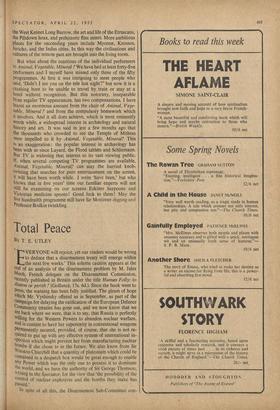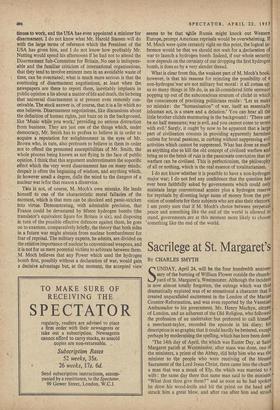Total Peace
tinues to work, and the USA has even appointed a minister for disarmament. I do not know what Mr. Harold Stassen will do with the large terms of reference which the President of the USA has given him, and I do not know how profitably Mr. Nutting would spend his afternoons if he had not to attend the Disarmament Sub-Committee for Britain. No one is indispens- able and the familiar criticism of international organisations, that they tend to involve eminent men in an avoidable waste of time, can be overstated; what is much more serious is that the continuing of disarmament negotiations, at least when the newspapers are there to report them, inevitably implants in public opinion a lie about a matter of life and death, the lie being that universal disarmament is at present even remotely con- ceivable. The stock answer is, of course, that it is a lie which no one believes. Disarmament negotiations, like discussions about the definition of human rights, just buzz on in the background, like 'Music while you work,' providing no serious distraction from business. They are just one of the things which, under democracy, Mr. Smith has to profess to believe in in order to acquire a reputation for enlightenment in the eyes of Mr. Brown who, in turn, also professes to believe in them in order not to offend the presumed susceptibilities of Mr. Smith, the whole process being known as not flying in the face of public opinion. I think that this argument underestimates the soporific effect which the very word disarmament has on many minds; despair is often the beginning of wisdom, and anything which, in however small a degree, dulls the mind to the dangers of a nuclear war is for that reason a disservice.
This is not, of course, M. Moch's own mistake. He lends himself to one of the characteristic moral fallacies of the moment, which is that men can be shocked and panic-stricken into virtue. Demonstrating, with admirable precision, that France could be devastated by fifteen hydrogen bombs (the translator's equivalent figure for Britain is six), and disposing in turn of the possible effective defences against them, he goes on to examine, comparatively briefly, the theory that both sides in a future war might abstain from nuclear bombardment for fear of reprisal. The military experts, he admits, are divided on the relative importance of nuclear to conventional weapons, and it is not for us mere potential victims to arbitrate between them. M. Moch believes that any Power which used the hydrogen bomb first, possibly without a declaration of war, would gain a decisive advantage but, at the moment, the accepted view seems to be that chile Russia might knock out Western ' Europe, prompt American reprisals would be overwhelming. If M. Moch were quite certainly right on this point, the logical in- ference would be that we should not wait for a declaration of war to launch a hydrogen bomb. Indeed, if our whole security now depends on the certainty of our dropping the first hydrogen bomb, it does so by a very slender thread.
What is clear from this, the weakest part of M. Moch's book, however, is that his reasons for rejecting the possibility of non-hydrogen war are not military but moral : it all comes up. as so many things in life do, in an ill-considered little sentence popping up out of the subconscious stratum of cliché in which the consciences of practising politicians reside : 'Let us make no mistake: the "humanisation" of war, itself an essentially inhuman act, is a snare and a delusion.' You can hear all the little brother clichés murmuring in the background : 'There can be no half measures; war is evil, and you cannot come to terms with evil.' Surely, it ought by now to be apparent that a large part of civilisation consists in providing apparently harmless outlets for brutal passions, in curbing without suppressing evil activities which cannot be suppressed. What has done as much as anything else to kill the old concept of civilised warfare and bring us to the brink of ruin is the passionate conviction that no warfare can be civilised. This is perfectionism, the philosophy of all or nothing, which is the real essence of totalitarianism.
I do not know whether it is possible to have a non-hydrogen major war; I do not feel any confidence that the question has ever been faithfully asked by governments which could only maintain large conventional armies plus a hydrogen reserve for reprisals by diverting large sums of money from the pro- vision of comforts for their subjects who are also their electors; I am pretty sure that if M. Moch's choice between perpetual peace and something like the end of the world is allowed to stand, governments are at this moment more likely to choose 'something like the end of the world.











































 Previous page
Previous page